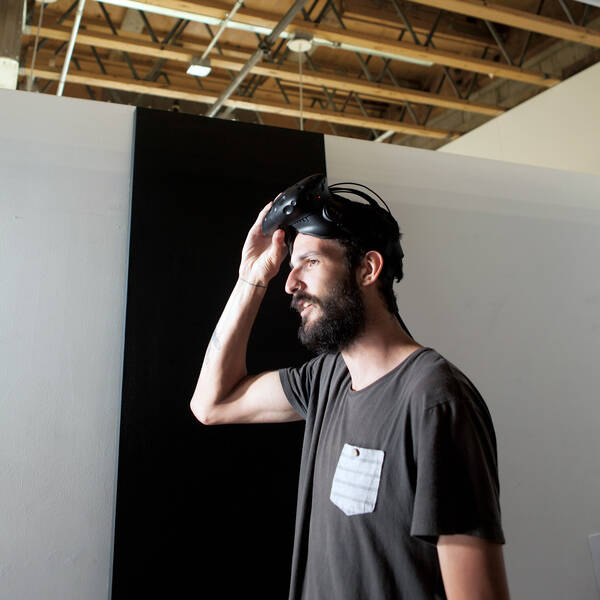
feature / students / transportation-design / sponsored-projects / internships
March 22, 2017
Writer: Solvej Schou
Photographer: Juan Posada
Knowledge is Power: A Transportation Design Student’s Journey from Zimbabwe to ArtCenter
One day, when then 6-year-old future Transportation Design student Thokozani Mabena was playing with friends in the shanty town where he grew up, in authoritarian-ruled Zimbabwe, he was drawn to a magazine he spotted near some trash bins.
Poring through the magazine, Mabena saw an article showcasing a Japanese designer who conceptualized the Nissan Z sports car. The article also featured a big, round, bright orange dot. Mabena didn’t know, during that pivotal moment of curiosity, that the dot represented ArtCenter, but he instinctively liked the article’s gorgeously vivid car design sketches.
“I’ve been sketching since I was 3. I was like, ‘Wow, maybe this is something I could do one day!’ and I just stored the thought in my memory bank,” said Mabena. “I didn’t know what a classic car was. I knew public transportation. I rode in carriages, pulled by a donkey. One time I rode an actual bull. Sometimes we had to walk long distances. Sometimes we took a truck with an open bed, and stood for hours. We rode bicycles, and in trains, buses, and then cars.”
Three decades after first seeing that ArtCenter Dot, Mabena—who came to the United States in 2006 as a refugee—is now set to graduate this term, and will debut his ArtCenter Grad Show thesis project Airbnb-GO on April 20.
Designed for older riders, including aging baby boomers, the conceptual project revolves around an ergonomic vehicle that can fit up to four people, like “a house on wheels, but futuristic,” Mabena said, with space to easily stand and programmed interactive experiences to ease loneliness. Windows would resemble Transitions lenses, dimming and adapting to the harsh glare of sunlight.
“I made it an important point to say, ‘I’m not going to design another luxury vehicle,’” he said. “I wanted to create an experience that connects older people. I come from a culture where if you’re elderly, you’re highly respected because you have wisdom to pass down. ‘Knowledge is power.’ That’s what we believe in Africa. Money comes and goes. With knowledge, no one can take that away from you. That’s the biggest thing for me, coming to ArtCenter. I gained a power. I’m like a superhero, in a way. I can use my skills to help and empower other people.”

‘Knowledge is power.’ That’s what we believe in Africa. With knowledge, no one can take that away from you. That’s the biggest thing for me, coming to ArtCenter. I can use my skills to empower other people.
Thokozani Mabena

Similar to a zig-zagging road, Mabena’s own journey from Zimbabwe to ArtCenter is filled with twists and turns, and sacrifice.
Mabena, who has a green card, isn’t allowed back into Zimbabwe because of his U.S. asylum status. His parents still live there, and his sister, a professor, lives in South Africa. Since coming to the U.S. 11 years ago, Mabena has seen his parents only once, in 2013, on a visit to Africa. He’s set to get his American citizenship after graduation.
“My mom is my rock, and taught me the strength of empathy. Before I was born, she had survived mass killing—she was going to be executed—and escaped during the night. If she didn’t escape, I wouldn’t be here today,” said Mabena recently—black glasses perched on his nose—surrounded by grass and willowy trees outside on the Hillside Campus. “Unrest was starting to happen in Zimbabwe when I was a kid and it got worse as I grew up,” he added.
Driven by an absolute hunger for knowledge, Mabena got a scholarship to attend a diverse international high school in Zimbabwe, then graduated with an undergraduate architecture degree, with honors, in South Africa. When he came to the U.S. alone at age 19, he lived in cities around the country. He did door-to-door sales, worked as an au pair, and then as an architect in San Diego.
ArtCenter kept popping up in ads and on LinkedIn and he remembered that magazine article. He decided to pivot his career.
When Mabena first applied to the College in 2011, he was told to boost his architecture-based portfolio with automotive design work, and take an ArtCenter at Night Transportation Design class. Awarded the ArtCenter at Night Nissan Diversity Scholarship in Fall 2010, he commuted after work a whopping 85 miles each way from San Diego to the class, in Irvine. Instructor Jason Hill became, and continues to be, his mentor. Mabena applied to ArtCenter again, and started in 2012, aided by a beefed-up portfolio and a TED Talk he did in 2011.
“Jason is a legend. He believed in me,” Mabena said. “I had to overcome the fear of, ‘How am I going to make it here? How much is this going to cost me?’ Even right now, I send money back to my family. With ArtCenter, I had moments when I slept in my car, for two years. Then I told ArtCenter, and they said, ‘Why didn’t you tell us before? We will help you.’ They did.”
Mabena received the donor-funded Nissan Diversity Scholarship in Spring 2015 and Spring 2016, and the General Motors Minority Scholarship in Spring 2016. This term he was awarded the Transportation Design Department Scholarship.

As an architect, Mabena designed hotels, skyscrapers and retail stores. At ArtCenter, within a robust multicultural environment, his creativity evolved, and he’s tapped into “a new-found confidence,” he said.
In a Spring 2015 interdisciplinary sponsored team project with Land Rover spearheaded by another mentor, Interaction Design Chair Maggie Hendrie, Mabena explored the link between design and empathy. The group created a transformative and comfortable car seat—without seatbelts.
“I learned I was not a traditional Transportation Design student who wanted to do a traditional car,” he said. “Going into the Interaction Design side of things taught me that I can create better experiences using technology. That class allowed me to see the deeper side of human experience.”
From there, Mabena landed a 10-month internship with Audi, in Santa Monica, in April 2015, with a focus on interiors and user experience. Last May, he snagged an internship with start-up technology and sustainable mobility company Rivian Automotive in Detroit. His Grad Show project—with input from Jason Hill, Maggie Hendrie, Transportation Design instructor Marek Djordjevic and others—is “a complete summary of my journey,” he said.
“My goal is that once I leave ArtCenter, I want to be at a place—whether in the U.S., Europe or somewhere else—that will allow me to solve problems for people, to reach 80 percent of the population,” said Mabena, who has his eye on companies including Rivian, Lucid Motors and Audi.
“I also still want to give back to Africa. The global economy is shifting, and there’s a boom in China, but there’s also a new boom coming, in Africa,” he said. “My value as a designer is what I’ve learned in architecture, and in automotive design, and also my connection to Africa. I’m very fortunate, as an African, to be able to make it to America to learn as much as I can. The sacrifices I’ve made are for the betterment of my family’s life, for me to reach for my dreams, and do things that felt impossible.”





